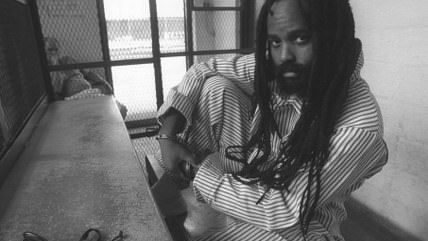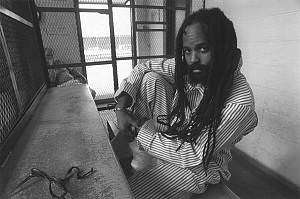Penn. Anti-Speech Law Designed to Censor Mumia Abu Jamal (and Others) Ruled Unconstitutional
No, the state cannot forbid those convicted of crimes from saying things that could 'retraumatize' their victims.


Last fall, Pennsylvania passed an outrageous anti-free-speech law designed entirely because lawmakers were upset that convicted cop-killer Mumia Abu-Jamal was giving a pre-recorded commencement speech to a pack of Vermont college students. The law stated that those who had been convicted of crimes could not say or do anything that makes the victim or victims feel "a temporary or permanent state of mental anguish."
Yesterday a federal judge struck down the Revictimization Relief Act as "manifestly unconstitutional." From PennLive:
The attorney general's office defended the act, claiming it was justifiable to prevent criminals from causing their victims more harm.
[U.S. Middle District Chief Judge Christopher C.] Conner found the Constitution's First Amendment free speech guarantees trump such concerns, however.
"A past criminal offense does not extinguish the offender's constitutional right to free expression," the judge wrote. "The First Amendment does not evanesce at the prison gate, and its enduring guarantee of freedom of speech subsumes the right to expressive conduct that some may find offensive."
He also found the Revictimization Act to be 'unlawfully proposed, vaguely executed and patently over-broad."
"However well-intentioned in its legislative efforts, the General Assembly fell woefully short of the mark," Conner wrote.
Conner pointed out how the proponents of the law were actually promoting the fact that it would silence Abu-Jamal. They vagueness of the law also made it impossible for those targeted to know in advance what sort of speech, actions or comments would "revictimize" somebody, resulting in an obvious chilling effect.
Eugene Volokh over at The Washington Post delves further into the legal problems with passing such a censorious law here.
Editor's Note: As of February 29, 2024, commenting privileges on reason.com posts are limited to Reason Plus subscribers. Past commenters are grandfathered in for a temporary period. Subscribe here to preserve your ability to comment. Your Reason Plus subscription also gives you an ad-free version of reason.com, along with full access to the digital edition and archives of Reason magazine. We request that comments be civil and on-topic. We do not moderate or assume any responsibility for comments, which are owned by the readers who post them. Comments do not represent the views of reason.com or Reason Foundation. We reserve the right to delete any comment and ban commenters for any reason at any time. Comments may only be edited within 5 minutes of posting. Report abuses.
Please to post comments


And I'm looking forward to progs defending this decision (as should everyone) while calling for harsh penalties for speech from people they don't like, or which they feels traumatizes them.
Ayup. There's gotta be a lot of cognitive dissonance over this one.
If the state can lock you in a cage for the rest of your life, I fail to see how they can't also take away your free speech. I don't have a problem with the result of this decision. Who cares what these people have to say? I am just not seeing how it is the right one given what the government can already do to you once you are convicted of a crime.
If the state can lock you in a cage for the rest of your life, I fail to see how they can't also forcibly sterilize you.
If the state can lock you in a cage for the rest of your life, I fail to see how they can't also prohibit you from exercising your religion in any way while you're there.
Etc.
It's jail. I don't see why they don't just ban the prisoners from having tape recorders.
"If the state can lock you in a cage for the rest of your life, I fail to see how they can't also take away your free speech. I don't have a problem with the result of this decision. Who cares what these people have to say? I am just not seeing how it is the right one given what the government can already do to you once you are convicted of a crime."
Are you seriously arguing that once someone is convicted of a crime they forfeit their free speech rights?
Have to agree with the Irish one here. Seriously, John. This kind of stuff is why people call you Red Tony. It's non-sensical and borderline trolling.
It was unconstitutional John because it was censoring content based on a vague and ill-defined standard. Prisons are within their rights to restrict or revoke certain privileges for corrective or punitive reasons but I don't think they can ban you from writing letters or making recordings based on what you might say in them.
Yeah, they can't regulate the speech, but they probably are able to restrict access to means of conveying the speech(tape recorders, pencils, etc.)
provided it is done indiscriminately
Blanket bans on such means of expression would not fly.
http://www.aele.org/law/2007JB.....MLJ301.pdf
Also, John, remember that this law also applied to people who had served their sentences, and people who hadn't even been convicted yet. And to third parties writing about such people.
And to third parties writing about such people.
I think that's the big one. Once the speech is out, you just can't restrict other people from disseminating it, even if it is constitutional to restrict inmates' speech.
Judging by the fact a great deal of the criminal code has no business being called "law" I find it fundamentally unjust that felons be denied rights to free speech. Now if the prison doesn't let the guy teleconference, fine. If the university doesn't let the guy teleconference into their graduation ceremony, even better. In fact I'd say it's sad commentary that this guy is being celebrated by academia at all, but that's an indicator of other problems altogether. Not a demonstration of need for speech chilling statutes.
For Bo there's free speech and then there's free speech. He likes neither.
We know.
What?
Who cares what these people have to say?
In the case of Mumia, quite a few people seem to.
I agree that if you can lock someone up for life, then it seems like taking their other rights is probably OK too.
But if they are allowed communication with the outside world, then people who can receive that communication are free to do what ever they want with it. I think that's the problem. They are restricting the free expression of people who are not in prison, which is definitely not OK. You may be able to restrict the speech of a convict, but you can't restrict the dissemination of their speech once it gets out into the broader world.
Why does PA hate trigger warnings?
...the Constitution's First Amendment free speech guarantees trump such concerns, however.
Your right to speak stops at my delicate ears.
"The law stated that those who had been convicted of crimes could not say or do anything that makes the victim or victims feel "a temporary or permanent state of mental anguish.""
This is a ridiculously horrible law. You have to love laws that are based entirely on subjective feelings because there's no way to know if you're breaking it.
New law: Any legislator who advocates and sponsors a blatantly unconstitutional law like this has to pay for every cent the state spends defending it out of his or her own pocket.
Dumb law. And everyone should have the right to a process which sorts out their guilt, and I'm of course open to the possibility that the authorities and the system get things wrong.
But it's not like the case in question here is obviously wrong. Given that, how awful is it to have this fellow as your commencement speaker? There's at least a good chance he's a murderer. There's bound to be many honest to goodness exonerated cases they could have invited if that's what they were after.
For Bo there's free speech and then there's free speech. He likes neither.
Whatever Mr. Autism USA.
Great argument as usual.
Hmm, was there an argument in your original post? Because like you and social/emotional intelligence I must have missed it.
That you like to pick and choose based on the whims of your emotions.
Wow, you're so stupid and you don't even realize how stupid you are. Truly breathtaking.
Dear Mr. Miskin:
You're a fucking idiot. Please never speak again.
Love and kisses,
Andrew
"You're a fucking idiot. Please never speak again."
Well, he had good intentions!
In addition to punishing people based on the victim's subjective feels, we're supposed to care about what the 'point' of the law was, as if that has any relevance.
I hate this subjective nonsense that has nothing to do with the law or its enforcement. If a law is bad, who gives a shit what the 'point' of the law was?
Start creating safe spaces from troublesome opinions, soon you realize that you can't stop.
I like to think of the Pennsylvania law as a kind of trigger warning.
When did Oberlin students take over the Pennsylvania Republican Party?
Oh, Republicans have always had their drama queens too.
A past criminal offense does not extinguish the offender's constitutional right to free expression,"
but it extinguishes his constitutional right to keep and bear arms.
Mumia should have been executed long ago but as long as he remains alive, he should have the right to free speech
PERIOD
It's a fucking abomination that colleges have used him for commencement speeches, but it's exactly the kind of abomination the 1st amendment exists to protect - OFFENSIVE speech
And you can't get more offensive than the Marxist ramblings of an unrepentant murderous piece of shit
This law is especially ridiculous as is pretty much any law that prohibits something based on how it makes people 'feel'
It smacks of the leftist belief that there is a right to be protected from stuff that offends or scares you
Mumia should have been executed long ago but as long as he remains alive, he should have the right to free speech
PERIOD
It's a fucking abomination that colleges have used him for commencement speeches, but it's exactly the kind of abomination the 1st amendment exists to protect - OFFENSIVE speech
And you can't get more offensive than the Marxist ramblings of an unrepentant murderous piece of shit
This law is especially ridiculous as is pretty much any law that prohibits something based on how it makes people 'feel'
It smacks of the leftist belief that there is a right to be protected from stuff that offends or scares you
Mumia should have been executed long ago but as long as he remains alive, he should have the right to free speech
PERIOD
It's a fucking abomination that colleges have used him for commencement speeches, but it's exactly the kind of abomination the 1st amendment exists to protect - OFFENSIVE speech
And you can't get more offensive than the Marxist ramblings of an unrepentant murderous piece of shit
This law is especially ridiculous as is pretty much any law that prohibits something based on how it makes people 'feel'
It smacks of the leftist belief that there is a right to be protected from stuff that offends or scares you